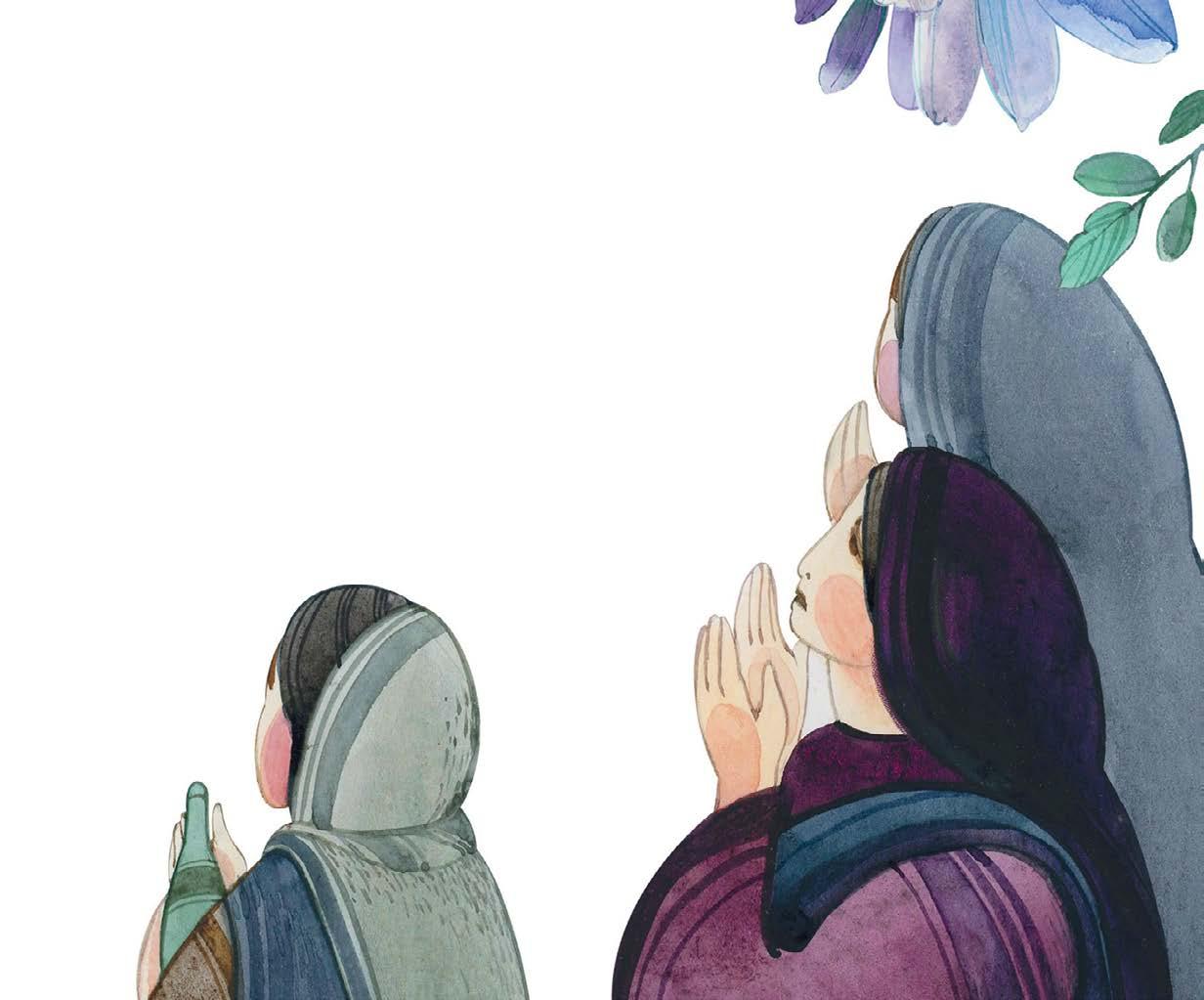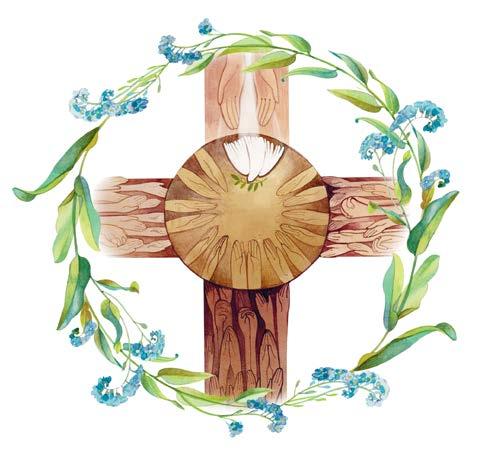
5 minute read
Rev Deacon Jenny Preston
An important word for me: remember what he told you: the four gospels all have stories about women remembering – Mary Magdalene, Mary mother of James, Salome, the wife of Cleopas.
Hope began with the murmur of these women on a Sunday morning at very early dawn, women who had travelled with Jesus and the disciples to Jerusalem, healing and teaching about the Kingdom of God.
When all the stories of appearances were put together, they listened to each other, and became the communities of the early church, enfleshing their Gospel for their own community as they lived into Jesus’ passion, his passion for bringing about the Kingdom, the Kingdom on earth, for a world turned upside down by their passionate conviction, intensity and desire.
Recently I’ve been preaching on the Day of Mourning, and the Beatitudes, and my remembering took me back to Liberation Theology by Gustavo Gutierrez; recently honoured by the Pope for his preferential option for the poor and discarded of society.
Jesus is still recruiting for the Kingdom of God now, a Kingdom where everyone is welcome to the table and to the bread, as we continue to find ways to overthrow the humanly created world of injustice and violence to remake it into a world of justice and non-violence.
‘I have come that they may have life, life in abundance’: John 10: 10.
The death of Jesus
It was now about noon, and darkness came over the whole land until three in the afternoon, for the sun stopped shining. And the curtain of the temple was torn in two.
Jesus called out with a loud voice, “Father, into your hands I commit my spirit.” When he had said this, he breathed his last.
The centurion, seeing what had happened, praised God and said, “Surely this was a righteous man”.
When all the people who had gathered to witness this sight saw what took place, they beat their breasts and went away. But all those who knew him, including the women who had followed him from Galilee, stood at a distance, watching these things.
(From Luke 23)
As a born scientist, “but that I can’t believe!” has been my usual response to so many of the beliefs that some would claim are required of Christians.
I can remember arguing with my Sunday School teacher at age seven that the story of Noah and the Great Flood was impossible, and as time went on, I added to my growing list of absurdities the virgin birth, the Transfiguration, the Ascension, numerous so-called miracles, e.g. walking on water, and, of course, rising from the dead.
‘But in 1st Corinthians 15:12-17, Paul proclaims resurrection as the essential element of our faith, does he not?’
Yes, but this is only a problem if one equates ‘resurrection’ with rising from the dead.
In another letter, Paul wrote, “For neither circumcision nor uncircumcision counts for anything, but a new creation.”
(Gal. 6:15)
Perhaps for Paul these ‘essentials’, resurrection and new creation, are synonymous.
Paul, a transformed Saul, experienced the New Creation of which he wrote.
He experienced the death of his Old Being and was resurrected as a New Being.
Rev Bob Thomas jesus has risen
Early on the first day of the week, while it was still dark, Mary Magdalene went to the tomb and saw that the stone had been removed from the entrance.

So she came running to Simon Peter and the other disciple, the one Jesus loved, and said, “They have taken the Lord out of the tomb, and we don’t know where they have put him!”
So Peter and the other disciple started for the tomb. Both were running, but the other disciple outran Peter and reached the tomb first. He bent over and looked in at the strips of linen lying there but did not go in.
Then Simon Peter came along behind him and went straight into the tomb. He saw the strips of linen lying there, as well as the cloth that had been wrapped around Jesus’ head. The cloth was still lying in its place, separate from the linen.
Finally the other disciple, who had reached the tomb first, also went inside. He saw and believed (they still did not understand from Scripture that Jesus had to rise from the dead). Then the disciples went back to where they were staying.
(From John 20)
Paul wrote in the Second Letter to the Corinthians, “If anyone is in union with Christ, he is a new being; the old state of things has passed away; there is a new state of things.” (5:17)
Paul knew resurrection personally. Anthony de Mello tells the story of the wise Master who explained to his frustrated disciples, “You have yet to understand … the shortest distance between a human being and the truth is a story.”
Like this Master, and like Jesus, the Gospel writers used stories to bring us closer to the truth.
We’re missing the point of the Easter story if its truth for us hinges on an historical dead body becoming alive.
If so, Easter joins the list of absurdities proclaimed by the ‘Old Time Religion’. But if Easter is about radical transformation akin to new life arising from death, now, then not only can I believe, I can shout, “Hallelujah!”
At the bottom line, no religion, no religious belief, including belief in the bodily resurrection of Jesus, matters one whit, but with Paul I can proclaim the Easter message that there is a New Creation, and we are asked to participate in it.
When it comes to the experience of Lent and Easter, I deeply value the season we have been gifted to take us through this path of transformation.
For this annual mini-pilgrimage as followers of the way, the deeper we go into Lent the more we witness autumn’s shedding.
For me this helps me appreciate something I hold dear: that the Easter event is not merely an event of 2000 years ago, but is actually the great and continuous movement of the Spirit.
It is a heartbeat that governs all of life and all of faith, that of continual death and renewal, an endless dance of dying and rising.
In autumn, as in Easter, we appreciate that the death we are surrounded by proceeds a greater life to come.
In the autumnal letting go, a great compost is taking place. Old life is breaking down to enable a richer more fertile life to emerge.
Jesus Has Risen
By God’s great mercy he has given us a new birth into a living hope through the resurrection of Jesus Christ from the dead, and into an inheritance that is imperishable, undefiled, and unfading, kept in heaven for you, who are being protected by the power of God through faith for a salvation ready to be revealed in the last time.
1 Peter 1:3-5
Rev Matt Cutler

In the dying, new seeds are being scattered that will allow future growth.
Because the Spirit for me is the source and life force of all things, Easter is not a one-time show, but the way the Spirit eternally works.

It is therefore the pattern of transformation in my own life and indeed the very pattern of the cosmos. This season therefore, is both a celebration of an event, but also an invitation into a journey that is always taking place and one I am invited to more fully participate in.
As leaves fall around us, and as we continue to be surrounded by signs and stories of death and decay, I tend to journey with questions such as: what do I need to die to, that new life might rise and spring forth? What is breaking down so that fuller and freer life might open up? How might God, the Spirit of life and ground of all being, be birthing new life through this and every apparent death?
We have walked through this Holy week, hearing stories of betrayal, denial, conviction and then crucifixion.
We lamented together on Good Friday amid dashed dreams and the crucifixions that continue to surround us.
But today we rejoice because we know that love wins, because today reminds us that the light can break through the deepest darkness.
Today we rejoice because death is not the end.

WHEN




